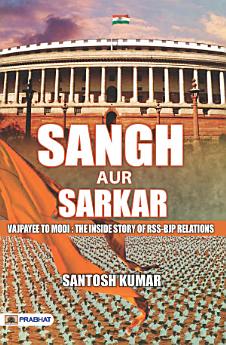Sangh Aur Sarkar: Sangh Aur Sarkar: Organization and Government by Santosh Kumar
About this ebook
The book delves into pivotal moments in modern Indian politics, such as the handling of reservations, the selection of Uttar Pradesh’s Chief Minister, the appointment of the BHU Vice Chancellor, and the resolution of the JNU controversy. Kumar narrates how ideological clarity and effective communication between these two entities led to seamless resolutions and strengthened the ideological movement. Through social harmony campaigns, intellectual discourse, and grassroots outreach in over three lakh villages, the Sangh-BJP network has expanded its influence, setting the stage for a decisive electoral mandate.
Furthermore,
***** Aur Sarkar"" examines key ideological triumphs post-2019, such as the revocation of Article 370 and the construction of the Ram Mandir, reflecting the Sangh’s long-term vision and its alignment with governance strategies. Kumar presents a compelling argument on how decades of ideological groundwork were actualized within just six years, paving the way for a 'New India.'
This book is an essential read for political analysts, scholars, and anyone interested in the intricate mechanisms of governance, ideology, and social transformation in India. With well-researched insights, Santosh Kumar provides a rare glimpse into the synergy between social organizations and political power, making this book a crucial addition to contemporary political discourse.
---***** “A deeply researched and compelling account of how the Sangh and BJP navigate governance and ideology. Kumar’s analysis is thorough and engaging, making this book a must-read for anyone interested in Indian politics.”
**** “A fascinating exploration of the Sangh’s growing influence in governance. The book provides detailed insights into key political events. Some sections could have been more detailed, but overall, a very informative read.”
**** “Santosh Kumar provides a balanced and insightful analysis of the Sangh-BJP dynamic. The writing is engaging, though certain topics could have been expanded. A great resource for understanding contemporary Indian politics.”
*** “An interesting read for those looking to understand the political and ideological coordination between the Sangh and the government. However, I found some sections a bit one-sided and lacking critical viewpoints.”
***** “A powerful and eye-opening book! Kumar expertly captures the complexities of political strategy, governance, and ideology. Whether you agree or not, this book provides valuable perspectives that shape modern India.”
Ratings and reviews
- Flag inappropriate
- Flag inappropriate
- Flag inappropriate








